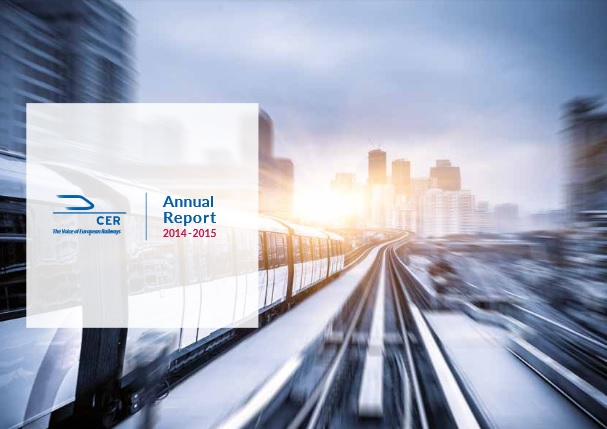Annual Report 2014-2015

During the last twelve months the EU political landscape has changed, with the European Parliament holding its eighth elections since 1979 and a new College of Commissioners coming into office.
And it is with a certain sense of solemnity that we look at these moments: they are in fact an occasion to reinforce our commitment to represent the European rail sector vis à vis the European institutions; to give voice to the concerns of rail businesses while constituting a reliable partner for all EU stakeholders; and to give a European dimension to the ambitions of each one of our members.
Like every year, the Annual Report provides a round-up of CER´s work over the past year. It is a good way, we find, to take stock of all those important steps we took together towards a more sustainable, better-connected and more prosperous European railway area.
Over the past months, we have repeatedly advocated policies fostering rail freight. We have worked hard to encourage the European Commission to establish rail freight as the backbone of the EU logistics chain for goods. We have highlighted how this will require a fair intermodal environment, which needs to be further pursued so that train operators can realise their full potential. A revitalisation of all policies aimed at internalising external costs is thus urgently needed.
Infrastructure investments have been at the core of our message, and we have witnessed an aggressive, ambitious attempt to attract private resources for key infrastructure projects in the shape of the proposal for a European Fund for Strategic Investments – an attempt which we nevertheless believe should be remodelled to some extent.
We have seen the Council work on the Fourth Railway Package and take concrete steps forward on all its parts. While we do give clear preference to the Technical Pillar, we hope the Package as such will be the last major rail regulatory bundle for the next decade.
As for the future, we look forward to the 2011 Transport White Paper assessment. We would like to see that the ambitious goals of the Paper are re-confirmed, especially regarding the modal-shift targets. Because curbing mobility is not an option; but neither is business as usual.
With growing demand and constantly improving customer services, rail passenger operators will contribute to a shift towards the safest, least polluting and most energy-efficient mode of transport — especially in the case of long-distance and urban travel — and will play a role in promoting sustainability. Moreover, railway operators play a positive role in society, providing millions of green jobs and offering access to employment.
Furthermore, a new buzzword, already familiar in our companies’ strategy departments, has started echoing in the Brussels’ corridors: digitalisation of railways. Clearly this is simply the latest in the string of challenges our sector has already taken up. In an ever more connected world, where technology helps businesses break efficiency barriers, we are fully committed to lowering those barriers even further.
Last but not least, we will continue to work strenuously for the promotion of our policy priorities for 2014-2020, which we have been developing over the past months: the stabilisation of the EU acquis for rail; the promotion of a pro-growth agenda which can foster high-speed services, a buoyant rail freight market and reliable infrastructure financing; and the establishment of equal pricing and fiscal policies across all modes.
We hope you will enjoy reading our Annual Report, and we look forward to continuing working together for the sake of the European rail sector!
